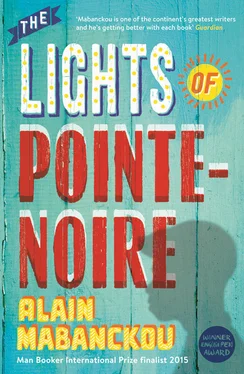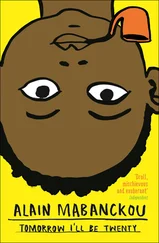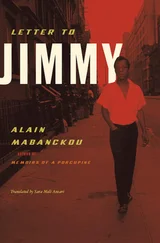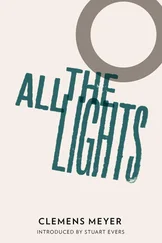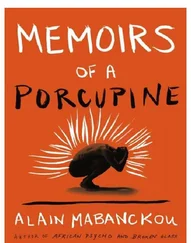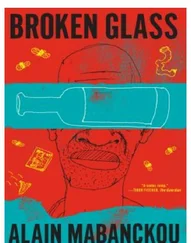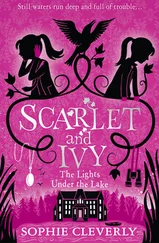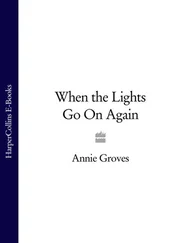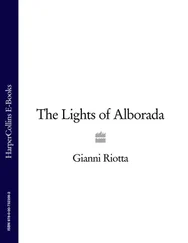By the time I passed into the second year of lycée in 1981, the school had already changed its name and had been known as the Lycée Karl Marx since 1975. President Marien Ngouabi had been assassinated by his own supporters in 1977, but the politicians who succeeded him pursued exactly the same line of ‘scientific socialism’, mixed up with a little tropical capitalism. We looked to the Soviets to teach us mathematics, chemistry, physics and philosophy. Obviously we now swore by Lenin, Engels and Marx; all those other philosophers, like Plato, Kant and Hegel were too idealistic, according to our authorities, and were outlawed, to be mentioned only in contrast to the ‘true’ philosophers, those who had introduced and analysed ‘historical materialism’ and ‘dialectics’, notably the authors of the Communist Party Manifesto , whose portraits hung proudly in every classroom, on the main streets, at intersections, beside the official photo of the man who was president of the republic, head of the government and president of the central committee of the single party, the Congolese Workers’ Party, all rolled into one. The systematic linking of our head of state with Karl Marx and Engels led us to feel that all three were thinkers of equal stature, even if we only ever learned speeches by our president, rather than profound philosophical texts. For the average Congolese person, the president was as much of a philosopher as Marx or Engels. So you could study Marxist-Leninist thought in the speeches of the head of state, instead of wasting your energy reading a great tome like Das Kapital by Marx, or a short but nonetheless deep book like Ludwig Feuerbach and the End of Classical German Philosophy , by Engels. So the pupils mostly quoted the president, who himself had quoted Marx and Engels, and thus we learned what some secretly termed ‘the philosophy of poverty’.
One direct consequence of the influence of the Soviet Union on our education was the decline of two languages considered to be the languages of the capitalists, and therefore to be banned: English and Spanish. You have to wonder why we continued to use French, with the implication that this language hadn’t come from the capitalist world, and was actually a Congolese language.
The fact remains that Russian became the first foreign language, particularly since the USSR offered the Congolese bursaries by the bucketful, despite the shortage of candidates who, for the most part, secretly dreamed of going to study in France, rather than of joining the ranks of cut-price graduates returning from Moscow, who were then given jobs at the School of the Party, to spread Marxist-Leninist ideology. In an attempt to get the pupils to look to the Soviet Union, some teachers who were members of the Congolese Workers’ Party would sneer:
‘What the hell use is English going to be to you, since you’re never going to go to England?’
The supervisor isn’t surprised when I ask to meet my old philosophy teacher, who is by far the teacher who left the greatest impression on the ‘Stream A’ pupils in my generation at the lycée. Since we didn’t know his first name, we called him ‘Monsieur Nimbounou’, or behind his back by his nickname, ‘Nimble’. We’d pass him on the Avenue of Independence, standing at a bus shelter, with his briefcase, on to which he had stuck a picture of Auguste Rodin’s The Thinker . When asked what it symbolised, he would reply:
‘Throughout our lives we should be constantly challenged by the thoughts of the great writers. Rodin’s Thinker is an example of the man who is constantly engaged in thought, and having him with me imposes a spiritual discipline which even religion cannot offer the faithful…’
The supervisor tells me that Nimble doesn’t teach philosophy any more, that he is a Board Inspector now. And he’s over in a different part of the building where a teachers’ meeting is being held.
We cross the schoolyard and go over to the meeting room. Outside, the supervisor hesitates, asks me to wait for a moment, and goes in without knocking. Less than two minutes later he comes back out, followed by a man in a suit.
For a moment I don’t move, transfixed once more, I think, by the fascination this teacher exerted on us as pupils, when he arrived in class with his briefcase, and suddenly all the chatter ceased. He would enter slowly, place his things on a table and sit down on a chair by the window. He would open a book and begin the lesson, without a hint of a cough in the room. His teaching was seen as an invitation to independent thought, a far cry from the slogans of the Party. Setting aside Karl Marx and Engels, he would randomly invoke Descartes, Montesquieu, Voltaire, Plato, Kant and Nietzsche. Philosophy seemed to us like an extraordinary odyssey, spiced up with entertaining anecdotes, such as the one about Diogenes of Sinope who lived in a tub. Monsieur Nimbounou took a sly pleasure in explaining to us how this particular philosopher was a sworn opponent of conformism, barking like a dog, pissing and masturbating in public. And when he spoke of Epicurus and the cult of pleasure, we all smiled, and he did too, with that sly look of his, which he has to this day. He would stand up, looking very serious, and say:
‘Now Epicurus had the right idea, he defined pleasure as the absence of pain. I share his view myself, though it must be said that the perversity of human beings is such that sometimes pleasure, for some people, can only be achieved through pain. Which goes to show that at all times you must seek the antithesis of any given thesis, and from there proceed to a synthesis which reflects your independence of mind…’
Hypnotised by the breadth of his knowledge, we created a discussion group in the lycée. During these sessions, in which we also talked of poetry, we would imitate him by reading whole pages of some ‘capitalist’ philosophy which was taught nowhere except in our class. We were disappointed to discover that the study of historical materialism did not provide the same delight or enthusiasm as classical philosophy. But Monsieur Nimbounou could not entirely neglect the programme imposed by the Ministry of Education. So he would skim over the thought of Marx and Engels and quickly come back to what he considered true philosophy, that of the school of Antiquity.
We have been chatting for ten minutes or so, not far from the meeting room. Monsieur Nimbounou is talking about my books, some of which he has read:
‘My favourite of all is Memoirs of a Porcupine. Perhaps because, without realising it, you posed some philosophical questions in it. Can animals be philosophers? Isn’t philosophy exclusively a feature of human thought? That’s pretty well what I taught you back then…’
The supervisor agrees with a nod of the head, while, to change the subject, I tell Nimble that I thought he had retired.
He smiles:
‘Our country doesn’t yet have enough philosophers for me to be able to retire. And I’m afraid that until my dying day there will be some who go on believing it’s possible to live without philosophising…’
Just as I’m leaving him, I take an envelope from my pocket and hand it to him. He smiles again and pockets it. In the meeting room a voice can be heard saying:
‘What about us? Don’t we get anything?’
Nimble turns round, surprising some of his colleagues, who are watching through the slats in the blinds.
‘He wasn’t your pupil, that’s the difference,’ he says, in their direction.
He folds me in his arms and murmurs:
‘I have to go back into the meeting. I’m so glad you came… Don’t forget: some philosophers only interpreted the world; what we have to do now is transform it. That’s possibly the only thing I learned from Engels, for everything else you’re better off with the philosophy of Antiquity…’
Читать дальше
